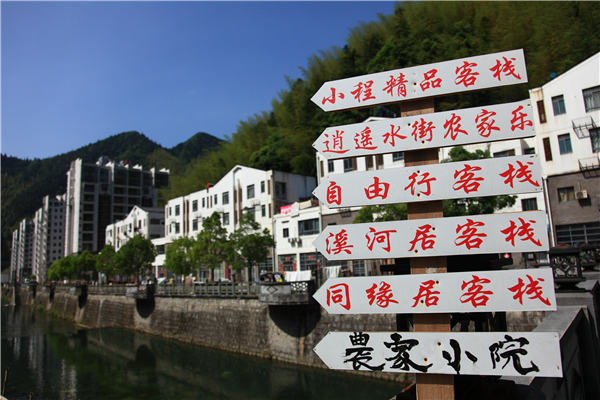Rural tourism gives economic boost to villages
 |
|
Road signs for hotels in Tangkou township near the rural areas of scenic Huangshan Mountains in Anhui province. Provided to China Daily |
While most Chinese were relaxing during the recent weeklong National Day holiday, Wang Zaolin was seeing his busiest time of the year.
The peak travel week brings hordes of city dwellers to his hotel to seek pastoral pleasures. The rustic hotel in Hongcun, an ancient village in East China's Anhui province, has 20 beds and can accommodate 100 people.
"Both visitors and revenue have surged nearly 50 percent this year," says Wang, adding that he is seeing the best business since the hotel opened in 2000.
Wang attributes the boom mainly to a nearby high-speed railway line, which started operation in June, and the Internet.
The Hefei-Fuzhou high-speed rail line stretches for about 800 kilometers through southeastern China and has substantially cut travel time in the mountainous region.
Wang began to advertise his hotel on a tourist website earlier this year, and visitor numbers are rapidly increasing. He calls his hotel "a small example of 'Internet Plus' tourism", referring to a government plan to link traditional industries to the Internet to fuel growth.
Wang earned 200,000 yuan ($31,500) last year, and he is expecting "a better harvest" this year.
In China's southern island province of Hainan, Wang Liqiang, a newcomer to the village hotel business, is also benefiting from blossoming rural tourism.
Wang's village, Beireng, became famous after it was visited by the wives of state leaders during the annual Boao Forum for Asia in March. He sensed a business opportunity and opened a hotel called Nostalgia.
During the National Day holiday, known as the "golden week" for travel in China, Wang served visitors vegetables and fowl that he grows and raises on the seaside property surrounded by coconut trees and bamboo fences.














